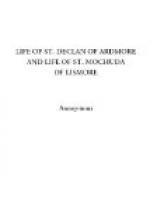The latest commentators on the question of St. Declan’s period—and they happen to be amongst the most weighty—argue strongly in favour of the pre-Patrician mission (Cfr. Prof. Kuno Meyer, “Learning Ireland in the Fifth Century"). Discussing the way in which letters first reached our distant island of the west and the causes which led to the proficiency of sixth-century Ireland in classical learning Zimmer and Meyer contend that the seeds of that literary culture, which flourished in Ireland of the sixth century, had been sown therein in the first and second decades of the preceding century by Gaulish scholars who had fled from their own country owing to invasion of the latter by Goths and other barbarians. The fact that these scholars, who were mostly Christians, sought asylum in Ireland indicates that Christianity had already penetrated thither, or at any rate that it was known and tolerated there. Dr. Meyer answers the objection that if so large and so important an invasion of scholars took place we ought have some reference to the fact in the Irish annals. The annals, he replies, are of local origin and they rarely refer in their oldest parts to national events: moreover they are very meagre in their information about the fifth century. One Irish reference to the Gaulish scholars is, however, adduced in corroboration; it occurs in that well known passage in St. Patrick’s “Confessio” where the saint cries out against certain “rhetoricians” in Ireland who were hostile to him and pagan,—“You rhetoricians who do not know the Lord, hear and search Who it was that called me up, fool though I be, from the midst of those who think themselves wise and skilled in the law and mighty orators and powerful in everything.” Who were these “rhetorici” that have made this passage so difficult for commentators and have caused so various constructions to be put upon it? It is clear, the professor maintains, that the reference is to pagan rhetors from Gaul whose arrogant presumption, founded on their learning, made them regard with disdain the comparatively illiterate apostle of the Scots. Everyone is familiar with the classic passage of Tacitus wherein he alludes to the harbours of Ireland as being more familiar to continental mariners than those of Britain. We have references moreover to refugee Christians who fled to Ireland from the persecutions of Diocletian more than a century before St. Patrick’s day; in addition it is abundantly evident that many Irishmen—Christians like Celestius the lieutenant of Pelagius, and possibly Pelagius himself, amongst them—had risen to distinction or notoriety abroad before middle of the fifth century.
Possibly the best way to present the question of Declan’s age is to put in tabulated form the arguments of the pre-Patrician advocates against the counter contentions of those who claim that Declan’s period is later than Patrick’s:—
For the Pre-Patrician Mission.
I.—Positive statement of Life, corroborated
by Lives of SS. Ciaran and
Ailbhe.
II.—Patrick’s apparent avoidance
of the Principality of Decies.
III.—The peculiar Declan cult and the strong
local hold which Declan has
maintained.




